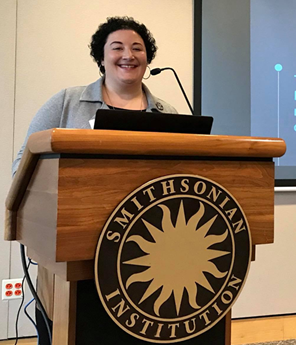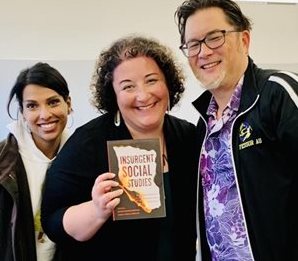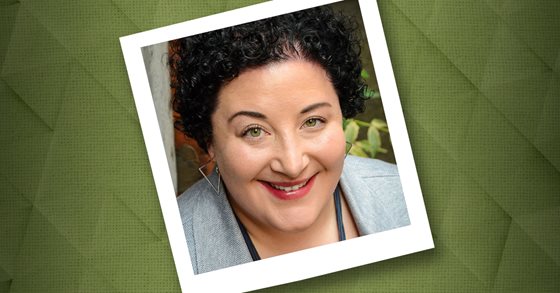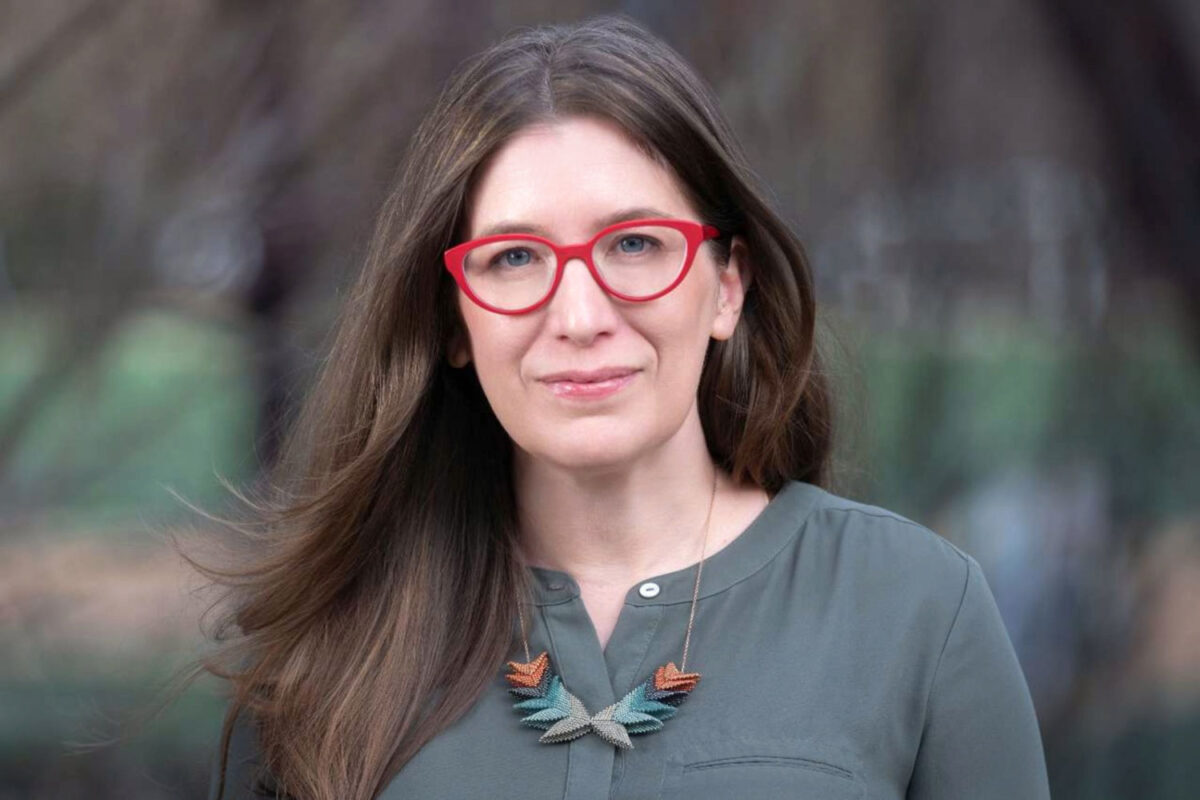Never in her wildest dreams did Dr. Sarah Shear imagine that her research study would take off in pop culture.
Yet it has done exactly that, going viral on Twitter, becoming a series of memes and even finding its way into a short animated film. “It totally took on a life of its own,” said Shear, associate professor in the University of Washington Bothell’s School of Educational Studies. “It turned into this completely unexpected, beautiful thing.”
Titled “Manifesting Destiny,” her groundbreaking research is the first national study on K-12 social studies standards at the state level, examining how they either include or erase Indigenous people and Native nations from United States history. The findings highlighted how Indigenous people are pushed to the fringes of the story. “Indigenous peoples are seen as having cordial relations with settlers, being obstacles for Manifest Destiny and the push West, and eventually, gone entirely, which is of course untrue,” Shear said.
“One of the findings that really just takes your breath away is that when Indigenous peoples are included in the standards, nearly 90% of the time they are only spoken about in pre-1900 contexts — never to be discussed again, as though they never existed at the turn of the 20th century.”
Thus far, according to Google Scholar, the study has accumulated 4,450 views and 266 citations and has become the go-to for learning and discussing curricular re/presentation of Indigenous people in countless social studies methods and research courses across the country. It also was featured in reports by the White House as well as the National Congress of American Indians and was wielded by advocates arguing for curriculum reform in at least seven states and the District of Columbia.
Research with real-world impact
In recognition of the impact her work has made, Shear was named the 2023 recipient for the American Educational Research Association’s Social Studies Research Early Career Award.
This annual award recognizes a scholar who has conducted a distinguished program of cumulative research in social studies education within the first decade following receipt of their doctoral degree. With this award, Shear is acknowledged for her outstanding contribution to the research field of social studies education.
Dr. Sohyun An, professor of Social Studies Education at Kennesaw State University, was one of three scholars who nominated Shear for the award. “What makes Dr. Shear outstanding is her engaged scholarship that has brought real-world changes in decolonizing social studies education,” he noted. “She is a true model of an insurgent scholar-educator. She has tirelessly and generously engaged with several stakeholders and institutions to decolonize social studies curriculum, standards and instruction.”
Suspicious from the start
Shear said she has been challenging the social studies curriculum since at least the third grade. “I have seemingly always been this way but without as a big of a vocabulary,” she joked. “I just knew something was off — that I was missing things but I didn’t quite know what they were at the time or how to ask the question other than ‘Are you sure that’s everything?’”
She distinctly remembers teachers sending letters home to her parents and even one of her middle school teachers calling her “disruptive” during a unit on the American Revolution. “I grew up in Connecticut, and lived and went to school between two Native nations. I was asking whether we were going to learn about the tribes’ involvement in the war,” Shear said. “I knew they were involved. I knew there was history there, and I wanted to learn it, but instead I was deemed a troublemaker.”
When Shear eventually became a teacher in that very same school district, she was met with a horrifying realization that the curriculum had not changed at all. And, in the years since, she has taken it upon herself to make that change — going back to school to obtain a doctorate in Learning, Teaching and Curriculum with concentrations in social studies education and Indigenous studies from the University of Missouri and committing her life’s work to combatting oppression in education and academia.
Curating a new curriculum
One of the major changes Shear has made to the field came shortly after publishing “Manifesting Destiny” when she challenged the National Council for the Social Studies to make a formal statement about social studies needing to redress its curriculum about Indigenous people.
Her leadership brought together Indigenous and non-Indigenous educators and scholars with expertise in the intersections of social studies and Indigenous studies to write an NCSS position statement on teaching about Indigenous histories.
The statement supports the creation and implementation of social studies curricula that explicitly presents and emphasizes accurate narratives of the lives, experiences and histories of Indigenous peoples, their sovereign nations and their interactions — past, present and future — with Euro-American settlers and the government of the United States. “Getting this approved and published was a huge milestone,” Shear said, “because now we have the means to hold them accountable.”
Revolutionizing the revolution

Shear’s work in the field soon caught the attention of the Smithsonian’s National Museum of the American Indian. In addition to speaking at the Smithsonian twice, she is now a collaborator with the National Park Service and with more than a dozen Native nations on their programming for the 250th anniversary of the American Revolution.
“I am now part of a team that is thinking critically about what the American Revolution is,” Shear said, “its story, how it’s been mythologized, the missteps that have been made in talking about what it was and who was involved — and how people, museums and national parks can really engage in a truth-telling and be more accurate about what happened.”
Shear said NPS is now reaching out and building relationships with leaders of the Native nations on the East Coast whose ancestors were directly involved in the American Revolution to help create programming for anniversary in 2026. Down the road, once the programming is created, Shear will support its translation into curriculum materials for classroom teachers.
“To be a part of this is such an honor,” Shear said. “In the Zoom rooms, I often think to myself, ‘Wow, this is so surreal.’ Sometimes I still can’t believe I get to do this for my job.”
Take the moment and run

For many early career scholars, this work and its extended impact alone would justify receiving an award. In addition to the above-mentioned work, however, Shear has also co-edited three books on critical issues in social studies education, published 21 peer-reviewed articles and 16 book chapters, presented at more than 60 conferences, and garnered more than 500 citations.
“Receiving this award is a moment to take pride in what I have done and to celebrate with the people who have been part of this journey with me,” she said. “I feel like this award is for all of us.
“I am so thankful and humbled and will take this moment and be very proud — but then it is time to get back to the work.”




